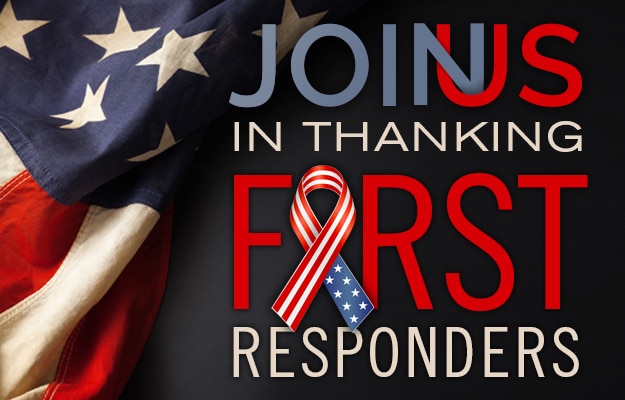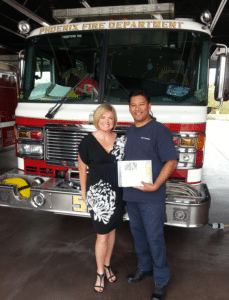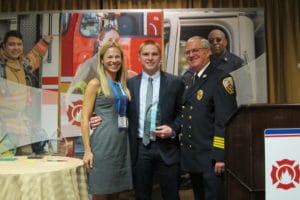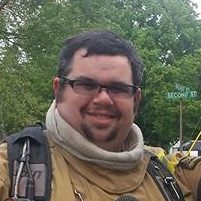by California Casualty | Firefighters, Peace Officers |
The words “incomprehensible,” “terrible,” and “devastation like we’ve never seen or imagined” continue to be used to describe the impact of the fires that ravaged and changed the face of Santa Rosa and areas of Sonoma and Napa counties in October. The images of the wind-blown firestorm are seared into our consciousness.
In the aftermath, vast acreage was blackened and trailer parks, hotels and neighborhoods were decimated – leaving our hearts heavy for those who lost family, friends or their homes.
It would have been much worse if not for the heroes who saved countless lives and property. During the firestorm, first responders stood tall as the fury unfolded around them. They made valiant runs into choking smoke and pitch dark conditions to rouse and rescue those caught off-guard, guiding and carrying the infirmed or confused as the relentless inferno consumed everything in its way. They are an inspiration to us all.
Most of those in uniform say they were just doing their job; helping others at their own peril, even while their homes and property were threatened.
As the smoke clears and the damage assessed, we want to thank all the first responders and volunteers who made a difference for so many.
Please join California Casualty in expressing our sincere gratitude to the hundreds of law enforcement officers, firefighters, EMTS and others who put themselves in harm’s way to protect our community. To all our heroes, we appreciate and thank you!

by California Casualty | Firefighters |
 California Casualty enjoys meeting our everyday community heroes and truly getting to know what they do every day. Jill, a local CalCas team member, got the chance to talk to one of our customers and learn about his story
California Casualty enjoys meeting our everyday community heroes and truly getting to know what they do every day. Jill, a local CalCas team member, got the chance to talk to one of our customers and learn about his story
Mark Gonzales is the newly promoted Phoenix Fire Department Battalion Chief. Mark celebrated his 20th year, but that wasn’t the only good news. Mark’s wife shared the good news that they would be expecting their 6th child later that year.
Jill says that during her station visit, she shared with Mark that her visits to Phoenix fire departments will be wrapping up. In an instant, Mark offered for Jill to come back to his station for a day of calls and rides. Jill enjoyed a tour of a hazmat and scheduling station, as well as the dispatch area at headquarters.
Mark had a positive story he wanted to share as a customer of California Casualty.
“I have been with California Casualty for over six years now. This past year my son turned 17, and we added him and a used suburban to our policy. With all of the bumps and bruises, a vehicle can handle we quickly learned of how extensive and forgiving our Auto glass coverage was. With three incidents in a short amount of time, California Casualty replaced the broken panels with a smile and taught us that every piece of glass on the vehicle was insured. We just added our daughter who has a permit now to our policy, and we are looking for a smoother road ahead.”
by California Casualty | Firefighters |
Drones: They are the new rage with millions now in the hands of hobbyists across the nation. They hoover, dive and provide amazing videos of dramatic scenery and inaccessible areas. While unmanned aircraft systems (UAS) can provide exciting new ways to recreate and view your neighborhood, they are also threatening firefighting operations across the U.S. The incidence of unauthorized drones spotted in fire areas across the country has increased dramatically the past few years, and the situation appears to be getting worse.
Unmanned aircraft have disrupted and canceled water and retardant drops because of the fear of a collision with firefighting planes. It’s also a hazard to smoke jumpers, helicopters and crews on the ground. Flying a drone near a fire is not only dangerous, it is illegal.
Anyone caught interfering with firefighting operations with a drone can be arrested and could face a $25,000 fine and criminal prosecution.
The following are some new strategies being employed to alert UAS pilots to areas they cannot fly, and to stop them if they do.
The FAA has is creating temporary “no-fly zones” around fires and making the information available to pilots of all types, especially recreational drone users. The FAA is urging all UAS operators to visit and download the B 4UFLY smartphone app that provides the restrictions in their area.
The U.S. Department of Interior has launched the “If YOU Fly, We Can’t” campaign with videos, PSAs and posters alerting drone owners of the risks.
Technology is also being tested to prevent drones from flying in areas where a restriction is in place. GPS and geo-fencing systems can literally ground a UAS in a fire-restricted area. The electronic blocking is already being employed around airports, military bases, nuclear power plants and the nation’s capital.
Keep in mind, it often takes a day or two before fires are noted and mapped for the system and the FAA warns that all pilots, including drone operators, are responsible for knowing the rules and local ordinances. In other words, you are responsible for flight safety at all times and can be cited for any careless or reckless actions that endanger others in the air or on the ground.
The FAA requires all operators to be 13 years or older and to register any drones that weigh more than .55 pounds. All UAS pilots must also adhere to these rules:
- Fly no higher than 400 feet
- Keep the UAS within sight
- Never fly near other aircraft, especially near airports
- Never fly over groups of people, stadiums or sporting events
- Never fly near emergency response efforts such as fires
- Never fly under the influence
- Be aware of airspace requirements
All the restrictions can be viewed at https://www.faa.gov/uas/getting_started/fly_for_fun/.
Education about the risk is considered the key to preventing more of these situations. If you have a drone, you need to know the rules of where and when to fly and be aware of the dangers to others. If you are a first responder, you may want to share this information with as many people as possible.
Firefighter’s jobs are already dangerous enough, that’s why California Casualty is asking all of us to be careful and know important drone rules that can save lives.
by California Casualty | Firefighters |
The National Volunteer Fire Council (NVFC) named Parker Ketler the 2017 Junior Firefighter of the Year at its spring board meeting April 7. California Casualty is a proud sponsor of the Junior Firefighter of the Year award and we were pleased to present Parker with his momentous achievement.
It’s easy to see why the NVFC chose him for the honor. Parker is the stepson of a firefighter and spent much of his childhood at the Sebring, Ohio Fire Department. That early exposure helped him excel when the department launched an Explorer Post in 2010. Chief Brian Anderson said that Parker was the obvious choice to become the Post’s first president.

Parker is dedicated to public safety; described as ambitious, eager and hardworking. He would often volunteer to do maintenance and other tasks at the fire station as a teen, and participated in demonstrations for other fellow students about the dangers of distracted driving.
Parker has earned several awards, including the 2016 Distinguished Volunteer Service Cross Commendation from the Village of Sebring, Alliance Elks Teen of the Month and the Award of Excellence for Sportsmanship, Ethics, and Integrity from the Ohio High School Athletic Association.
Parker continues his love for the fire service, pursuing a degree in Fire Science at Columbus State University, where he has earned his Firefighter I and II certifications and is undergoing EMT training. He has joined the Sebring Fire Department as a firefighter and serves each weekend with the department when his studies allow.
California Casualty is proud to serve firefighters, like Parker, for more than 40 years. Our company also provides funding for the NVFC Junior Firefighter Program Starter Kit, which aids fire agencies in starting their own program for their communities and to help develop future volunteer and career firefighters. Learn more about the Program at https://juniors.nvfc.org/resources.
by California Casualty | Firefighters |
Emergencies happen daily, and firefighters are the heroes to come to the rescue. As technology is constantly changing, it’s important that firefighters stay updated on the newest vehicles that have lithium-ion batteries and alternative fuel.
Here are some suggested guidelines for firefighter safety:
• Wear full PPE and SCBA
• Identify the type of vehicle involved
• Stabilize vehicle
• Use large volume of water to cool the fire and battery
• If possible, follow the wrecker to the storage area and place the car away from other vehicles, buildings, or combustibles.
Firefighters are trying to keep pace with the changing components and features of these cars. With new technology developing daily, firefighters face a challenge with new cars.
by California Casualty | Firefighters |
by Nick Magoteaux
Fighting fire in a rural environment is much different than fighting fire in an urban or suburban environment. Firefighters face many challenges in the rural setting, like lack of water, extended response time, and lack of manpower, just to name a few. Unlike urban or suburban area, rural areas do not have hydrants so this means firefighters must bring water to fight the fire. Many rural fire departments depend on volunteer firefighters, which in many cases respond from home to the fire station and then go to the fire. This factor and distance from the firehouse can lead to extended response times. Finally, and almost most importantly, is the lack of manpower. Volunteerism is unfortunately slowly dwindling away putting a strain on volunteer fire departments.
According to the United States Fire Administration, volunteer firefighters have declined by 13% or more. This has caused many fire departments to resort to hiring fire and EMS personnel to staff the station during the day or around the clock. This leaves many departments struggling to operate. Many volunteer or part time fire departments struggle to purchase or replace needed equipment due to tight budgets. Federal resources are drying up and taxpayers are less likely to approve higher funding for fire departments. This leaves these volunteer or part time fire departments in a bind.
Many firefighters can attest that they often don’t have the proper tools to do their job, but in a job where you improvise, adapt, and overcome, they make it work. There are many newer tools and equipment that can make firefighting more efficient or time saving. In a job where seconds counts, wouldn’t you want your fire department to have those newer, more efficient tools? That’s where Brothers Helping Brothers steps in. Brothers Helping Brothers specializes in helping the small and rural departments who are struggling to operate.
Brothers Helping Brothers is a 501c3 non-profit organization that works with firefighting equipment manufacturers and distributors to obtain tools and equipment at a lower rate, and grants them to struggling small and rural fire departments. Brothers Helping Brothers is completely funded by private donations. You can help struggling fire departments by donating to Brothers Helping Brothers.
- By donating just $10 per month, you can put a new axe or hand tool in the hands of a firefighter that needs it to battle a blaze. That’s only 33¢ a day.
- By donating just $25 per month, you can outfit a firefighter with a new set of boots, which may have been desperately needed to be replaced. That’s only 83¢ a day.
- By donating just $50 per month, you can purchase the Jaws of Life enabling that department to save a victim from an auto accident. That’s only $1.66 a day.
Donating just $100 per month can purchase a new SCBA air pack for a department who maybe using out dated one and with that air pack a firefighter could perform a rescue during a fire safely. That’s only $3.33 a day.
To learn more about Brothers Helping Brothers, or to how you can help. Please visit their website at www.brothershelpingbrothers.org.
 Nick Magoteaux has been in public safety for over 15 years. Nick has experience in law enforcement, dispatching, firefighting, and emergency medical service. Nick currently works for four different fire departments in Southwest Ohio, including the busiest fire department per capita in the state. Nick is also the founder and co-executive director of Brothers Helping Brothers, a fire service 501c3 non-profit that specializes in equipment grants to small and rural fire department in the U.S. Contact Nick at [email protected].
Nick Magoteaux has been in public safety for over 15 years. Nick has experience in law enforcement, dispatching, firefighting, and emergency medical service. Nick currently works for four different fire departments in Southwest Ohio, including the busiest fire department per capita in the state. Nick is also the founder and co-executive director of Brothers Helping Brothers, a fire service 501c3 non-profit that specializes in equipment grants to small and rural fire department in the U.S. Contact Nick at [email protected].


 California Casualty enjoys meeting our everyday community heroes and truly getting to know what they do every day. Jill, a local CalCas team member, got the chance to talk to one of our customers and learn about his story
California Casualty enjoys meeting our everyday community heroes and truly getting to know what they do every day. Jill, a local CalCas team member, got the chance to talk to one of our customers and learn about his story
 Nick Magoteaux has been in public safety for over 15 years. Nick has experience in law enforcement, dispatching, firefighting, and emergency medical service. Nick currently works for four different fire departments in Southwest Ohio, including the busiest fire department per capita in the state. Nick is also the founder and co-executive director of Brothers Helping Brothers, a fire service 501c3 non-profit that specializes in equipment grants to small and rural fire department in the U.S. Contact Nick at
Nick Magoteaux has been in public safety for over 15 years. Nick has experience in law enforcement, dispatching, firefighting, and emergency medical service. Nick currently works for four different fire departments in Southwest Ohio, including the busiest fire department per capita in the state. Nick is also the founder and co-executive director of Brothers Helping Brothers, a fire service 501c3 non-profit that specializes in equipment grants to small and rural fire department in the U.S. Contact Nick at